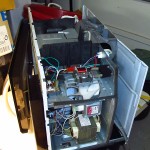In this ever complex world in which we live the rules are always changing, and usually getting more complex. A modern, information society has many rules that govern who owns what. Copy a photograph from the web and you are probably breaking the laws concerning copyrights. There is a complex and sometimes contradictory set of laws that governs all manner of ownership in this technological age.

Buy a CD with your favorite tunes… Can you copy the tracks onto your phone? Can you create a video with the music and post it to YouTube? What about that expensive photo software package? Can you put it on your laptop and desktop? The rules are often complex, and often the answer is not clear cut.
Increasingly we do not actually own what we buy. At least that is what many corporations will tell us.
You would think that the answer is easier if the thing we are talking about is a physical object. If you buy a car, can you re-paint it, install a new stereo, or ignition system. Of course you can do that. Can you? Sometimes the answer is no.
Increasingly corporations attempt to maintain control of a product after the sale. They use many tools to do this. One is intellectual property, copyrights and copy protection on the software that is now embedded into many of the things we buy.
One of the companies pushing hard on this front is John Deere. Increasingly the heavy farm machinery John Deere sells is protected by various legal tactics, primarily by relying on the Digital Millennium Copyright Act that among many provisions makes it illegal to bypass DRM, or Digital Rights Management protections. This covers the embedded software and the signals that connect many parts of the equipment.
Digital Rights Management, or DRM, was originally intended to prevent to copying of music and movies, as well as other software packages. These types of technologies were in their infancy back in 1996 when the DMCA was written. The major concern of the time was the MP3 file format. The practice of ripping CD’s was surging in popularity and music sharing services like Napster were changing the music industry. What was later realized by many companies was that the language of the law allows a far wider application than the authors originally envisioned.

To enforce this John Deere has engineered DRM into many of the components of their equipment. The system will not accept a new part if it is not authorized. Install a new transmission and a John Deere technician must enter the correct codes into the engine control computer for it to accept the new unit.
This is all the more striking in farming, where the do-it-yourself attitude and self sufficient spirit is so strong. Farmers have reacted badly to the corporate game.
John Deere is not alone in this, many other large companies, including General Motors and the other major automakers have argued much the same thing with their vehicles. In this day and age where a taillight might contain a CAN bus microcontroller and software, the answer is not obvious.
As a electronic engineer and hobbyist I have sometimes run into these issues. And like most I have found occasion to tread into legal grey areas when attempting to repair old equipment or even to just listen to music for which I paid.

Consumers have understandably balked at these attempts to control the market for supplies and spare parts. Kurig learned that you do not mess with people’s coffee and was forced to back off on the DRM restrictions.
The maker community also responds to these attempts at corporate control. You could quickly get devices that would defeat the DRM of Kurig cups, and can even get a device that tricks the Cat Genie into letting you refill your fancy litter box without buying expensive cartriges. While technically illegal under the DMCA, these devices are widely available and solve many issues for consumers.
Many of us do it. Want to load that DVD movie on your tablet so you can watch it on the plane? You paid for the DVD, why not? You can get a bit of marginally legal software that will allow you to rip the movie. Is this legal? Depends on which law you read. Breaking copy protection is specifically illegal, while format shifting to allow use of legally purchased media on another device is specifically allowed.
While the corporations have pressed the issue, others have pressed back, both with innovative tech, and in lawsuits. A recent legal decision at the US supreme court is a victory for this push-back. At issue is when a corporation ceases to own their product and when the purchaser buys the item. In this May 2017 decision the court reaffirmed that under US law the corporation “exhausts all rights under the Patent Act” upon legal sale of the item.

The case is emblematic of this whole issue and is probably not the end of it. There will be much more coming on this front as the law changes and as corporations adapt their products to use new legal strategies for control.
All the consumer can do at this point is be aware of the issue, potentially avoiding the purchase of products with unacceptable restrictions on the use, re-sale, or repair of the item. Personally I do look for this when purchasing, I avoid purchase of some brands. Are spare parts available? A big question in automotive and with home appliances. Are repair manuals available? Are there DRM parts or supplies involved? Even if the initial price is right there are factors that can significantly add to the cost of ownership in the long run.
Live and learn, it just gets more complex as we go along.


Interesting topic. Thanks Andrew!
I’ve been trying to move an old discontinued App from one cell phone to another ……..for several months now.
It’s appalling clear, despite having paid quite a bit for the phone, I do not own it.